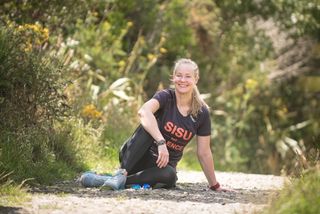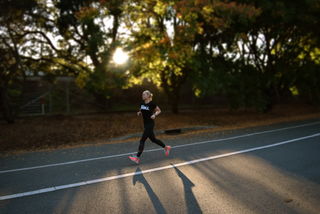Grit
An Ultramarathon Runner's Secret to Mental Toughness
Research shows that self-care can actually make you tougher.
Posted June 28, 2019 Reviewed by Abigail Fagan
Push harder, further, faster. Sweat, blood, and tears. That's the way to succeed, no matter what you want to do.
Or is it?
Emilia Lahti, a social activist and psychology researcher from Finland, knows a thing or two about grit. A survivor of domestic violence, she set out to personally experience extreme grit by running ultramarathons (50km/day) over 50 consecutive days across New Zealand.
People from the country of Finland, a country with a very harsh northern climate, have a special word for extreme grit and toughness: Sisu. Sisu is more than just grit, it's “taking action against slim odds,” Emilia says. “Sisu is the embodied counterpart of mental toughness,” Lahti explains. "It stems from the Finnish word for "guts."

Lahti trained for two years to get into perfect shape, and last January, she embarked on a journey that few would conceive as possible.
“My body made the decision to go on this quest,” Lahti shares. “I remember the moment when it happened. I felt it. I knew that it was time to start putting things together and to aim for this crazy thing.”
She also had an activist purpose. As a survivor of domestic violence, she ran to celebrate the strength of overcomers everywhere and to break the silence around interpersonal violence. The name of her New Zealand mission was Sisu Not Silence.
But Finland had not prepared her for the challenges of New Zealand that would start on day one, truly testing her sisu. The geography of south New Zealand is harsh, wild, and hilly, and the roads had a tilt that gave Lahti terrible knee pain almost immediately. The weather was also unseasonably hot. Her feet swelled, rendering her shoes too small. Her blisters soon became so large that pieces of skin fell off. Her support crew (Mna Holder - an ultrarunner with years of experience with running, including in the Sahara Desert) was unsure whether Lahti could make it.
“When I got to day 10 (after consecutive 50K days) the pain on the lower part of my foot became so bad that I had to walk, limping. I felt as if someone was drilling a root canal, and yet I somehow struggled through that day.”
She told herself, I will never do that again, never put myself through so much pain. On day 11 she ran as if in a trance, stopping only for 15 minutes to devour a vegan wrap (a strong proponent of compassion, Lahti ran her entire trip in a plant-based diet). She knew that if she stopped, she would not be able to continue. On day 12, Lahti walked the entire day. “This was the biggest learning of the entire run—and will define the rest of my life."
“I was at kilometer 44 and approaching Franz Josef Glacier, a very hilly area. I got to a bridge and realized that if I took one more step, I was doing this out of fear of failure. Out of fear of what people would think if I didn’t meet my goal.”

“The run had started to own me,” she said. “I had run past beautiful waterfalls, people, gorgeous scenery—without connecting because I was in so much pain. I understood what it’s like for people whose life situations are so difficult that they can’t be present. It’s hard to be present when you are in pain. I decided, tomorrow is a day off."
“It was an amazing pilgrimage from that moment on. What I heard the road tell me was ‘Emilia, you will never see the end of me and there will always be more when you turn the corner. This pain that you are experiencing will only stop when you say, Enough. You will be in pain until you make the call.’ It went back to my violent relationship, friendships, inner talk, things I did that were hurtful to me—the sense that I’m not worthy. At the end of the day, peace starts with me. I am the person in whose hands lies my wellbeing, happiness, and healing.”
We believe that grit through self-sacrifice is the only way we can succeed. That kind of grit might lead to success in the short run, but almost certainly leads to something else in the long run: burnout. Almost everyone buys into this kind of grit and it's the reason we're seeing 50% burnout across industries. Research shows that the kind of grit that comes with self-sacrifice and self-criticism actually leads to an inability to learn from one's mistakes and to bounce back from trials. It is linked to anxiety and depression and makes us feel beaten down when we mess up.
However, there's another kind of grit and mental toughness that will get you ahead over the long run–not to mention increase your happiness in the process. It's the kind of grit that is linked to self-compassion. In researching my book, The Happiness Track, I learned that self-compassion is the only form of grit that helps you survive and thrive over the long run. It is the secret to endurance that no one really considers. Yet research shows that self-compassion has a huge host of benefits: It increases resilience in the face of failure, gives you the ability to bounce back more quickly, to learn from your mistakes and grow from challenges without feeling beaten down. It is linked to psychological, relational, and even physical thriving. (For more, check out self-compassion pioneer Dr. Kristin Neff's book Self-Compassion)
Lahti took the next day off, got an X-ray of her foot, and then had to take another day off because of a cyclone. Then she biked for three days using a mountain bike that was kept at the back of van, but the bicycle gave her a knee injury. So she got back on her feet until her feet gave way—and still completed 2,400+ kilometers in 50 days. “In those 50 days, I experienced 50 deaths and resurrections.”
Here’s the key takeaway that Lahti learned about sisu: “It’s not about willing it. It’s only by surrendering that we can find it. Surrendering means accepting yourself as you are, letting go of trying to determine the outcome, raising your hands, doing the best you can, and being OK with it. It involves self-compassion. It’s like coming home.”
Self-care doesn't make you soft. It's not about self-indulgence. It actually allows you to stay tougher for longer, the research shows. Take it from an ultramarathon runner.
References
Lahti, E. (2019). Embodied fortitude: An introduction to the Finnish construct of sisu. International Journal of Wellbeing, 9(1), 61-82. doi:10.5502/ijw.v9i1.672




